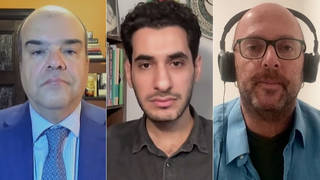
Topics
Guests
- Aaron Glantzcovers veterans and domestic military issues for the Center for Investigative Reporting. Glantz has spent more than 10 years covering the Iraq War and the treatment veterans receive when they come home. He is author of three books on the war, most recently, The War Comes Home: Washington’s Battle Against America’s Veterans. He also just wrote an article for the Center for Investigative Reporting in collaboration with ABC news called “Delays in Care Threaten Health and Safety of Veterans, New VA Whistleblower Says.”
- Jose MathewsVeterans Affairs hospital whistleblower. He said he was removed from his position as chief of psychiatry at the Veterans Affairs hospital in St. Louis after reporting unethical workplace conduct. After complaining, Mathews says he was demoted to the hospital’s basement where he now performs compensation and pension exams.
- Ariel Solomonattorney for Dr. Jose Mathews.
After news that dozens of U.S. veterans died during long waits for medical treatment, Veterans Affairs Secretary Eric Shinseki testified Thursday before a Senate committee about treatment delays and cover-ups at VA medical centers. The committee grilled him about recent claims that VA health clinics in Phoenix, Arizona, and Fort Collins, Colorado, used elaborate schemes to hide records of patients who waited too long for care, and suggested the problems may lead to a criminal investigation. We get reaction from Aaron Glantz, who covers veterans and domestic military issues for the Center for Investigative Reporting. We also speak with a VA whistleblower who says he was removed from his position as chief of psychiatry at a VA hospital in St. Louis after reporting unethical workplace conduct. Dr. Jose Mathews says he was demoted to the hospital’s basement where he now works on compensation and pension exams. He is joined by his attorney Ariel Solomon.
Transcript
JUAN GONZÁLEZ: “Mad as hell.” That’s the response from Veterans Affairs Secretary Eric Shinseki to news that dozens of veterans died during a long wait for medical treatment. Shinseki testified Thursday before a Senate committee and answered questions about treatment delays and cover-ups at VA medical centers.
ERIC SHINSEKI: Any allegation, any adverse incident like this makes me as—makes me mad as hell. I could use stronger language here, Mr. Chairman, but in deference to the committee, I won’t. But at the same time, it also saddens me, because I understand that, out of those adverse events, a veteran and a veteran’s family is dealing in the aftermath, and I always try to put myself in their shoes. In response to allegations about manipulation of appointment scheduling at Phoenix, I am committed to taking all actions necessary to identify exactly what the issues are, to fix them and to strengthen veterans’ trust in VA healthcare.
JUAN GONZÁLEZ: That was Veterans Affairs Secretary Eric Shinseki. The committee grilled him about recent claims that VA health clinics in Phoenix, Arizona, and Fort Collins, Colorado, used elaborate schemes to hide records of patients who had waited too long for care that meets the department’s goals. Shinseki vowed to fix any problems documented by an inspector general’s investigation, but stopped short of resigning. The nation’s largest veterans’ group, the American Legion, has called on him to step down.
AMY GOODMAN: For more, we go to St. Louis, Missouri, where we’re joined by a whistleblower who says he was removed from his position as chief of psychiatry at the VA hospital in St. Louis after reporting unethical workplace conduct. Dr. Jose Mathews says he was demoted to the hospital’s basement, where he now works on compensation and pension exams.
Here in New York, we’re joined by Dr. Mathews’ attorney, Ariel Solomon.
And in San Francisco, we’re joined by Aaron Glantz, reporter who covers veterans and domestic military issues for the Center for Investigative Reporting. Aaron has spent more than 10 years covering the Iraq War and the treatment veterans receive when they come home, author of three books on the war, most recently, The War Comes Home: Washington’s Battle Against [America’s] Veterans. And he also just wrote an article for the Center for Investigative Reporting in collaboration with ABC News about Dr. Mathews’ ordeal.
We welcome you all to Democracy Now! Aaron Glantz, let’s start with you. Lay out what the controversy is today, why Shinseki had to testify.
AARON GLANTZ: Secretary Shinseki had to go before Congress because news organizations have reported that there were as many as 40 veterans who died waiting for care at the VA hospital in Phoenix, Arizona, and that while they were waiting, the VA was simultaneously falsifying the official record of how long veterans were waiting, and keeping a secret list. So they had two lists. One list represented how long veterans were actually waiting, and that was secret, and the other list represented everything being absolutely fine and almost everyone being seen within two weeks. And that was what was presented to Washington.
In the aftermath of this report, there have been many other whistleblowers who have come forward across the country—in Chicago, in Texas, in Arizona, I already mentioned, in Colorado, and, of course, Dr. Mathews, as well—to talk about similar problems. And it reached a boiling point. And you mentioned this in your intro, that the American Legion called for Secretary Shinseki’s resignation.
These are old problems. It was mentioned in the hearing, Senator Patty Murray of Washington, who was previously the chairwoman of this committee, she mentioned these same problems were revealed in inspector generals’ audits in 2005, 2007, 2012. And Secretary Shinseki has been in his chair overseeing this agency the entire time. And yet, even now today, we see a scandal on this topic that’s bigger than any before it.
AMY GOODMAN: But this could be a—come to a criminal matter, is that right, Aaron?
AARON GLANTZ: Well, Secretary Shinseki was asked by one of the senators if he would bring the FBI in. And he would not promise to bring the FBI in, and that frustrated lawmakers that he was preferring only to look at it as, you know, an inspector general internal investigation. But there are many who believe that there should be a criminal investigation.
JUAN GONZÁLEZ: Well, Dr. Jose Mathews, could you talk to us about your experience at the St. Louis VA hospital, when you started—decided that you had to speak out, first within the administration there?
DR. JOSE MATHEWS: Yes. So, I took the chief of psychiatry position in November of 2012. And shortly thereafter, I started looking at how we were delivering care and what we were doing, mostly based on some veteran complaints about being turned away from the clinic because their doctor had called in sick. So I really wanted to know how busy we were and whether—why it was not possible to accommodate veterans who are ill and who are coming for their appointment. That was the starting point for digging deep.
And what I found, to my shock, was that the official productivity data that’s put out by the VA shows that the psychiatrists here and the mental health clinic here is extremely productive; however, when I look at the number of patients seen, the appointment times for those patients, they—I could not account for more than 50 percent of the time for the entire clinic. In essence, it was as if the clinic had decided that we’re going to only work for half a day, and we’ll call it a full day. And that’s been going on. And this was causing long delays for our veterans to get help, for follow-up care or the first appointment. And again, this is in the context of Missouri being one of the states with the highest number of veteran suicides. You know, unfortunately, we have 25 to 26 percent of all suicides in the state by veterans.
So, you know, I brought this—I took this very seriously, because this needed to be completely fixed. And the underlying aspect of, you know, the official data not reflecting reality was a big problem. And I was very vocal and very forceful in demanding that we follow real metrics, real data, that’s meaningful to the veteran, and also have veteran input. You know, the bizarre thing about the VA is that, you know, everybody chants the chorus, “Everything is awesome.” You know, that’s the tagline. You know, just yesterday, the VISN 15 director sent out an email to all the staff, which was later recalled, saying that, you know, we are doing great. You know, I do not know of any system where you can self-proclaim that you’re doing great when we do not have meaningful input from the veterans.
JUAN GONZÁLEZ: But, Dr. Mathews—
DR. JOSE MATHEWS: The survey that the veterans fill out—sorry, go ahead.
JUAN GONZÁLEZ: No, no. Dr. Mathews, what was the response? Once you compiled this data and you raised it to your superiors, what was the response?
DR. JOSE MATHEWS: Well, you know, initially, there was support for making the changes—I had not proposed, I had also instituted. However, the pushback from all the staff, all the specialties—and again, I don’t want to say that everybody was in this category. But easily, 50 percent of the staff were in this category of people completely resisting and coming up with any and all sorts of, you know, irrational objections to providing reasonable care. It reached a point where it was almost—you know, that I really felt that I might be in an alternate universe—
AMY GOODMAN: Dr. Mathews, could you—
DR. JOSE MATHEWS: —where simple things—sorry, go ahead.
AMY GOODMAN: Could you specifically refer to the emails you wrote about—in calling on them to investigate two allegedly preventable deaths of veterans?
DR. JOSE MATHEWS: Yes. There was a veteran, a young veteran, in a high-risk category for suicide, who had come in after, you know, a lot of encouragement from the veteran’s family members to seek help. And this veteran, unfortunately, was—after my thorough review, was not provided adequate care at our VA and died shortly after. He was discharged extremely soon. So I reviewed this case, and I had serious concerns about some processes that we had in place at the VA. And I wanted to have what’s called a “root cause analysis,” so that, you know, what we find can be fixed. This was one instance.
And the other instance was an elderly veteran who had both medical and psychiatric issues and was not appropriately evaluated at the emergency room and was sent to psychiatry. And unfortunately, this veteran died of medical complications that very night. So, and these two instances happened, you know, within a week.
And in both cases, I really wanted to have a root cause analysis, and I volunteered to either lead or be part of it. You know, people usually don’t want to commit to this, but I really felt that—very strongly, that we needed to look at our processes and improve it, so that we don’t have something like this happening again. And unfortunately, in the first instance, there was a technical out. You know, I don’t know if this is true or not, that there was another facility doing a root cause analysis, so we didn’t have to do it, although I did raise the point that the deficiencies that I found in our facility needed to be fixed.
AMY GOODMAN: Dr. Mathews, I just wanted—
DR. JOSE MATHEWS: And in the second instance—
AMY GOODMAN: —to bring in your attorney, Ariel Solomon.
DR. JOSE MATHEWS: Yes.
AMY GOODMAN: You’re now working in the basement. You’re no longer the head of psychiatry at the VA in St. Louis. The significance of this lawsuit?
ARIEL SOLOMON: Yes, so Dr. Mathews actually was forced to commence a lawsuit for whistleblowing, because after his disclosures, he ostensibly was constructively fired. He was working as the chief of psychiatry. He has an academic position. He’s obviously a very accomplished psychiatrist. And after making the disclosures, he was literally required to do comp and pen exams, which is, you know, document review, not as much patient care and, more importantly, very little access to the kinds of information that would facilitate additional disclosures and additional acts of whistleblowing.
AMY GOODMAN: And finally, back to Aaron Glantz, the significance of Dr. Jose Mathews coming forward? We just have 10 seconds.
AARON GLANTZ: Yeah, I mean, I think it just goes to show the issue of accountability, which was front and center in the Phoenix case, is national in scope. And no matter where you work at the VA, it can be difficult to come forward and disclose the issues that are most important to veterans.
AMY GOODMAN: We want to thank you all for being with us. Aaron Glantz, congratulations on your Peabody for your reporting on veterans. Dr. Jose Mathews, formerly chief of psychiatry at the VA in St. Louis. And Ariel Solomon, the attorney for Dr. Mathews.
That does it for our show. I’ll be speaking in Stowe, Vermont, tomorrow night, May 17th, at 7:00. You can go to our website at democracynow.org for information. Democracy Now! has three part-time video news production fellow jobs. Go to our website.












Media Options